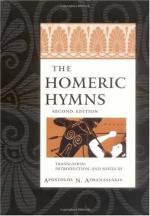“Lady Demeter, thou that bringest the Seasons, thou giver of glad gifts, which of the heavenly gods or deathly men hath ravished away Persephone, and brought thee sorrow: for I heard a voice but I saw not who the ravisher might be? All this I say to thee for sooth.”
So spake Hecate, and the daughter of fair-tressed Rheie answered her not, but swiftly rushed on with her, bearing torches burning in her hands. So came they to Helios that watches both for gods and men, and stood before his car, and the lady Goddess questioned him:
“Helios, be pitiful on me that am a goddess, if ever by word or deed I gladdened thy heart. My daughter, whom I bore, a sweet plant and fair to see; it was her shrill voice I heard through the air unharvested, even as of one violently entreated, but I saw her not with my eyes. But do thou that lookest down with thy rays from the holy air upon all the land and sea, do thou tell me truly concerning my dear child, if thou didst behold her; who it is that hath gone off and ravished her away from me against her will, who is it of gods or mortal men?”
So spake she, and Hyperionides answered her:
“Daughter of fair-tressed Rheia, Queen Demeter, thou shalt know it; for greatly do I pity and revere thee in thy sorrow for thy slim-ankled child. There is none other guilty of the Immortals but Zeus himself that gathereth the clouds, who gave thy daughter to Hades, his own brother, to be called his lovely wife; and Hades has ravished her away in his chariot, loudly shrilling, beneath the dusky gloom. But, Goddess, do thou cease from thy long lamenting. It behoves not thee thus vainly to cherish anger unassuaged. No unseemly lord for thy daughter among the Immortals is Aidoneus, the lord of many, thine own brother and of one seed with thee, and for his honour he won, since when was made the threefold division, to be lord among those with whom he dwells.”




